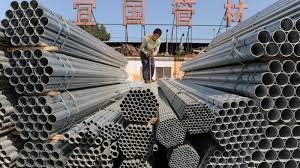Globaltraded.com — The recent re-election of Donald Trump as President of the United States has caused waves of anxiety and disapproval in several countries around the world. For some nations, Trump’s administration—focused on domestic policies, nationalism, and skepticism toward international alliances—creates uncertainty that threatens global stability and bilateral relations. Some countries feel threatened by Trump’s protectionist policies, which prioritize the interests of the U.S., while others worry about the impact of diplomatic tensions and unpredictable foreign policies. In this context, several countries, in particular, feel most threatened or dissatisfied with Trump’s policies, considering the significant influence the U.S. has in various geopolitical, economic, and security areas.
- China
China is the country most directly threatened by Trump’s re-election, given the longstanding trade and geopolitical tensions between the two nations. One of Trump’s main policies during his first term was the trade war with China. The high tariffs imposed on Chinese goods caused economic turmoil for both countries, while tensions grew over issues like technology, market access, and human rights. If Trump is re-elected, Beijing can expect more protectionist policies, technology restrictions, and potentially increased military tensions in the South China Sea.
- European Union
The European Union, as the largest trading partner of the U.S. and a key player in international alliances, has had a strained relationship with Trump during his first term. Trump’s policies, which often ignored multilateralism and supported a more unilateral approach—such as withdrawing the U.S. from the Paris Climate Agreement and the World Health Organization (WHO)—created uncertainty for European nations. The EU is also concerned about Trump’s protectionist policies, which could harm the European economy, and his confrontational stance toward traditional U.S. allies in international organizations. Trump’s re-election could threaten the sustainability of strategic relations and trade cooperation.
- Iran
Iran, long an adversary of the U.S., is significantly impacted by Trump’s aggressive foreign policies toward Tehran. Trump withdrew the U.S. from the Iran nuclear deal (JCPOA) in 2018 and imposed harsh economic sanctions, which crippled Iran’s economy and worsened its international relations. If Trump is re-elected, hardline policies toward Iran are likely to continue, threatening regional stability in the Middle East and exacerbating tensions between the two nations. For Iran, Trump’s re-election is a real threat to peace and security in the region.
- Mexico
Mexico is one of the countries most affected by Trump’s protectionist policies during his first term. Trump repeatedly targeted trade with Mexico, particularly concerning illegal immigration and trade agreements like NAFTA. Mexico felt the direct impact of the tariffs imposed by Trump on Mexican goods, as well as the threats to build a border wall that could strain bilateral relations. If Trump is re-elected, it could endanger Mexico’s economy, worsen social and political tensions related to immigration, and further deteriorate diplomatic relations that are already strained.
- Germany
As the largest country in the European Union, Germany has strong economic and political ties with the U.S., but Trump’s foreign policies, emphasizing nationalism and skepticism toward international alliances, have caused tensions. During his first term, Trump repeatedly criticized European countries, including Germany, regarding their NATO contributions and trade agreements. Additionally, his protectionist policies, including tariffs on European goods, added to the uncertainty. Germany, which prioritizes free trade and multilateralism, is concerned that Trump’s policies could continue to disrupt global economic stability and bilateral relations that have been built over decades.
- Canada
Canada, as the U.S.’s closest neighbor and a major trading partner, was directly affected by Trump’s policies during his first term. The trade war triggered by Trump’s tariffs on Canadian products and threats to withdraw from the North American Free Trade Agreement (NAFTA) shook bilateral relations. Although efforts were made to repair the relationship with the signing of the USMCA (the new trade agreement), uncertainty still surrounds the future of trade and economic cooperation. Canada, which is focused on international trade relations and multilateralism, fears that Trump’s protectionist policies could worsen economic uncertainty in the region.
- Russia
Russia is not particularly pleased with Trump’s re-election, despite Trump often showing a more favorable stance toward Russian President Vladimir Putin during his first term. However, Trump’s foreign policies, although soft in rhetoric, have tightened sanctions against Russia over issues such as the Ukraine crisis, Russian intervention in Syria, and alleged interference in U.S. elections. Trump’s re-election could escalate existing tensions, further threaten Russia’s economy, and worsen diplomatic relations, even though Putin and Trump might continue to have a more personal relationship.
- Saudi Arabia
Although the relationship between the U.S. and Saudi Arabia was closer during Trump’s presidency, with full support for the energy sector and Saudi foreign policies, some of Trump’s actions could pose risks to regional stability in the Middle East. Trump’s policies, which tend to support Israel and overlook human rights issues in Gulf countries, including Saudi Arabia, could create diplomatic tensions, particularly on peace agreements and the war in Yemen. If Trump is re-elected, this could worsen these tensions, and with China’s growing role in the region, Saudi Arabia might look for alternatives in its global alliances.
- India
India, despite having growing trade relations with the U.S., also sees potential negative impacts from Trump’s foreign policies, particularly in trade. The trade war triggered by Trump’s tariffs on Indian goods could worsen trade tensions between the two countries. Furthermore, Trump’s “America First” policies could hinder India’s efforts to strengthen strategic relations with Western countries and escalate tensions in diplomatic relations.
- Turkey
Turkey is a country that feels threatened by Trump’s often unpredictable foreign policies, which tend to favor U.S. allies in the Middle East, such as Saudi Arabia and Israel. Trump has taken a hard stance on Turkey’s policies in regions like Syria and Iraq, which has strained diplomatic relations between the two countries. Additionally, U.S. sanctions against Turkey over human rights issues and its purchase of the Russian S-400 defense system could further damage bilateral relations. If Trump is re-elected, these tensions are likely to intensify.

























































